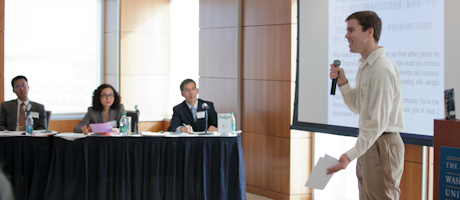First-year students often enter GW imagining the four years ahead of them will take a certain shape and follow a particular path. But sometimes a surreptitious encounter with a professor, friend, or experience can inspire students to leave behind their preconceptions in favor of paths they never imagined. Just ask senior Tim Quinn. For him, that journey started when he registered for Beginning Chinese, a course that would ignite a passion for language that eventually led him to study in China for six months, win two Chinese speech contests, perform with a famous Chinese actor, and earn a scholarship to graduate school at Nanjing University.
“If I can offer any other language students a piece of advice it would be this: Always remind yourself why you decided to learn the language by getting out there and using it,” said Quinn. “Use language to meet new people and do new things—you never know what sort of opportunities might open up!”
Shortly after Quinn began studying Chinese at GW, he met teaching instructor Miaochun Wei, who Quinn credits as being instrumental to his mastering the language. Wei introduced Quinn to the intensive language program in Beijing and encouraged him to apply. Quinn lived and studied abroad in Beijing for six months his junior year, improving his speech and deepening his understanding of the language, and then taught in Inner-Mongolia and Ningxia for three months as a Fulbright-Hayes Fellow with the Associated Colleges in China Rural Education internship program. His immersion changed the way he saw the language and people of China.
“Chinese language and culture are completely embedded within each other,” said Quinn. “The more I study the language, the more I am capable of understanding the culture; and the more I learn about the culture, the better I am able to understand the subtleties within the language. This relationship is by far one of the most interesting things I have ever encountered.”
That symbiotic relationship between language and culture motivated Quinn to deepen his studies when he returned from Beijing. In April of 2011, he entered and placed first in the 10th Annual Chinese Bridge Speech Competition preliminaries in Washington, D.C. In November, he won the Jiangsu Cup Speech Competition, which earned him a full scholarship to complete a master’s degree at Nanjing University—an unimaginable opportunity.
During the Jiangsu Cup Speech Competition, Quinn met Luqun Zhao, director of the Greater Washington Area Chinese New Year Gala. Zhao invited Quinn to dinner, where she introduced him to Qun Zhang, a talented Xiangsheng or “cross talk” artist (similar to a comedian) who has performed both in China and in the U.S. Zhang honored Quinn with an invitation to join him in a Xiangsheng performance at the Chinese New Year Gala in Washington, D.C. Xiangsheng performances are characterized by thick accents, puns, and jokes that reference events and persons of cultural significance. To prepare, Quinn explored the deeper meaning and cultural significance behind these references in order to understand the jokes he would perform.
“Working with Mr. Zhang was a remarkable experience. As a student who only started to learn the language four years ago, the thought of walking onto a stage and speaking Mandarin in front of an audience of nearly a thousand Chinese and Chinese Americans was enough to put more than a couple butterflies in my stomach,” said Quinn. “The audience was incredibly receptive to the jokes we performed and there were multiple times when I was forced to pause because the laughter from the audience was too loud for me to deliver my next line!”
Quinn will graduate May 20th with a BA in Anthropology and a BA in International Affairs with concentrations in Asian Studies and International Development. He leaves for Nanjing University this August. Though he’s still deciding what he’ll study in graduate school, Quinn imagines that he’ll expand upon his studies in anthropology.
“As a freshman registering for Beginning Chinese, I never thought that four years later I would be offered such an amazing opportunity to do graduate work at a prestigious Chinese university,” said Quinn. “I’m not sure where my experience in Nanjing University will take me, but you never know what sort of opportunities will open up!”


